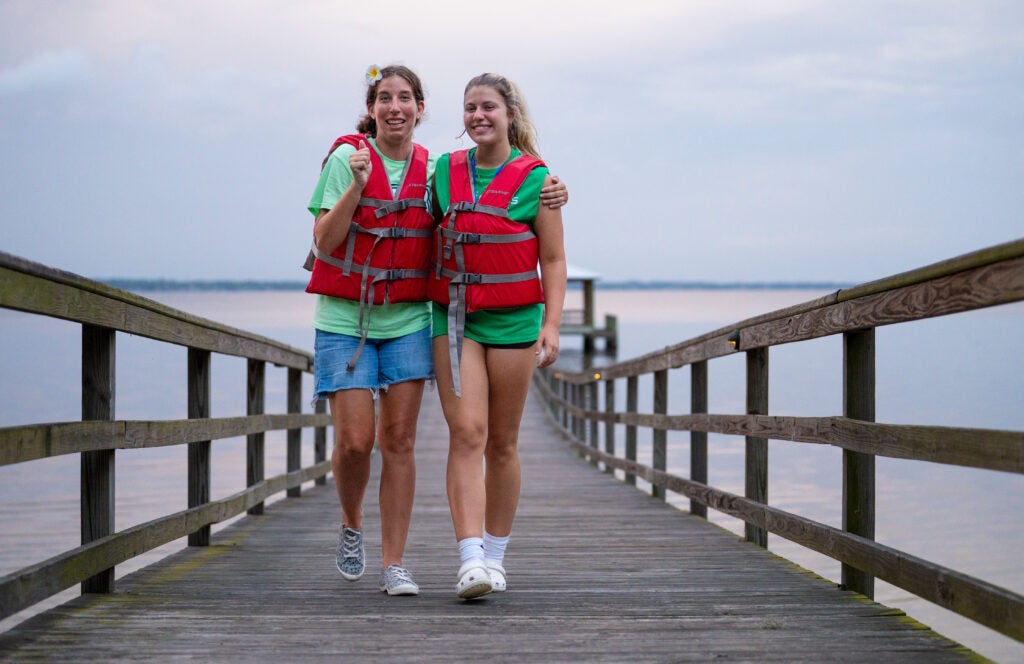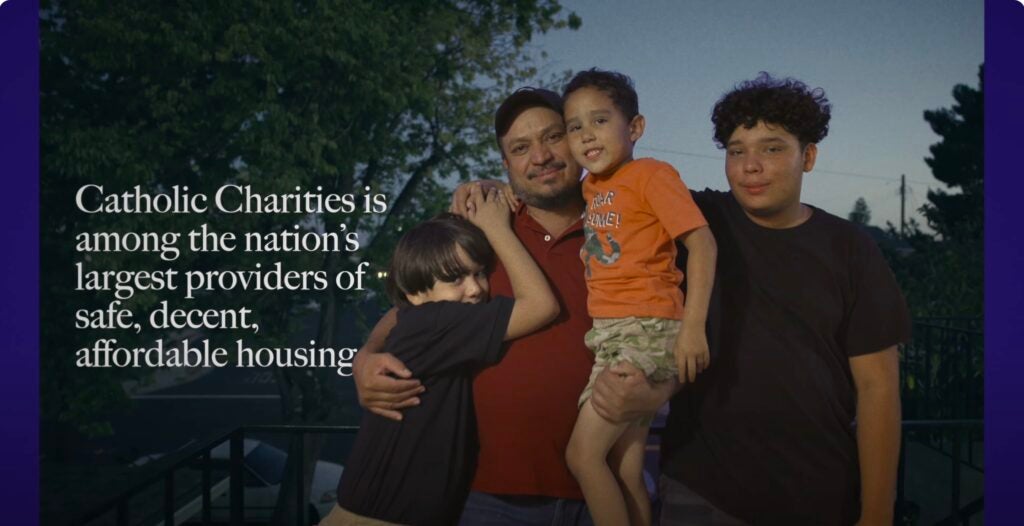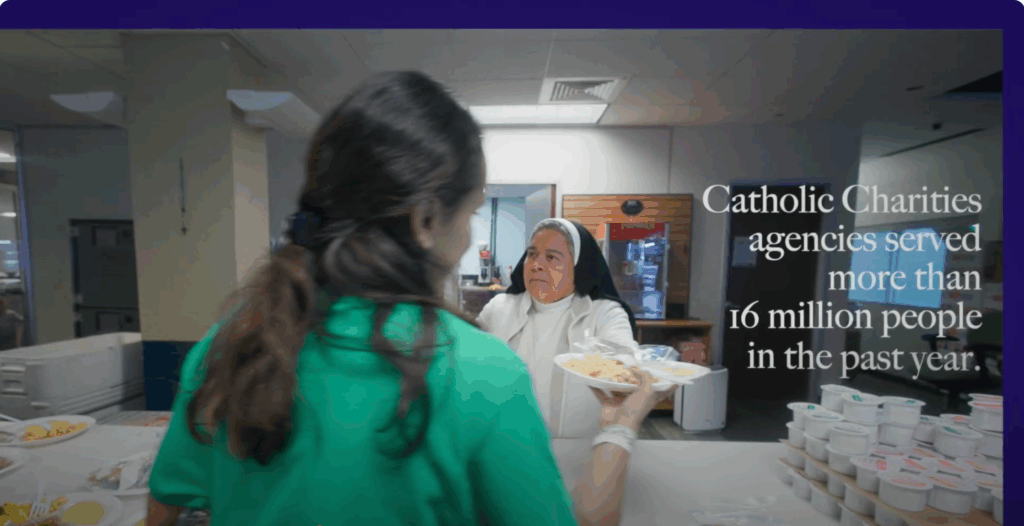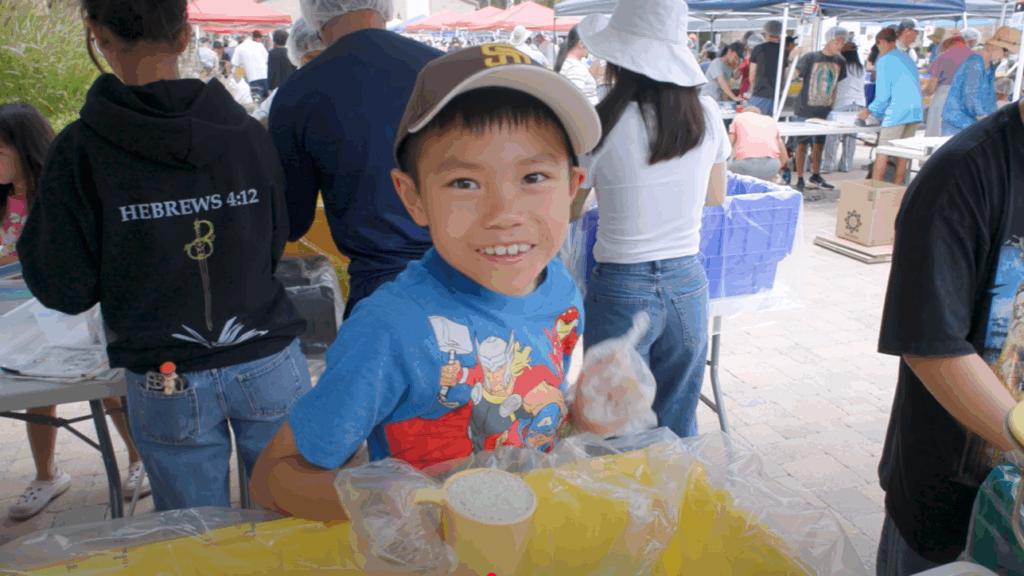
Companions on the journey: Nuns continue border work during pandemic
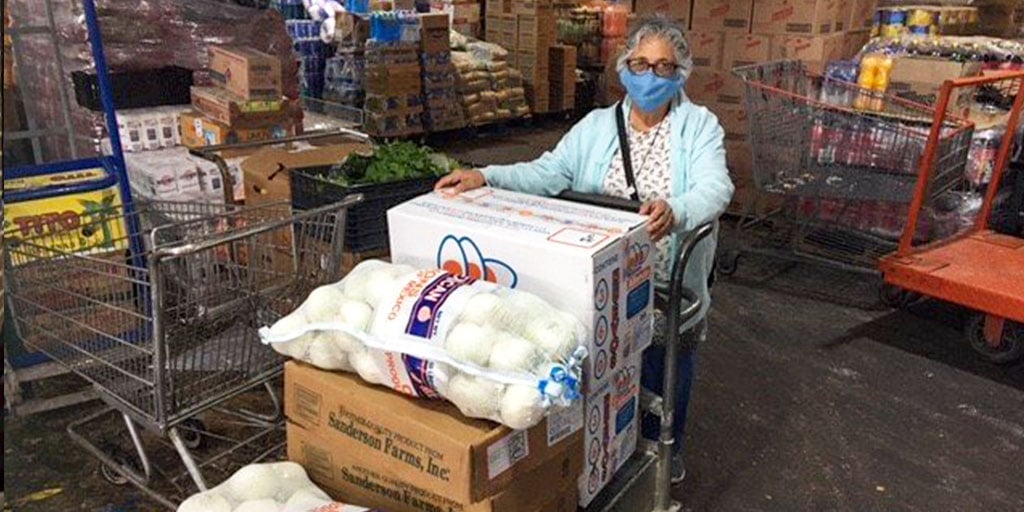
At the Gateway International Bridge that links Brownsville, Texas, to Matamoros, Mexico, a group of volunteers and Catholic sisters pull portable carts with diapers, tents, food and supplies. They cross the border into Mexico on foot, a small caravan of about 10-20 people. Their destination is the migrant camp on the other side, where asylum-seekers wait in tents for their chance to plead their cases before an immigration judge.
As the pandemic rages around the United States, most people curtail their social interactions to minimize their risk. These sisters, many in their 70s, have taken on more.
“They would provide a shoulder to lean on, provide the people an opportunity to tell their story (and) of course, a lot of hugs and kisses and spiritual, moral support,” said Sergio Cordova, co-founder of Team Brownsville, a nonprofit that provides aid to immigrants on the U.S.-Mexico border.
After the Trump administration enacted the Migrant Protection Protocols, or the “Remain in Mexico” policy, in January 2019, more than 60,000 asylum-seekers, a third of whom were children, were forced to wait for their U.S. court dates on the Mexican side of the U.S.-Mexico border. As a result, informal camps emerged.
As sisters accompany those in migrant shelters, take donations to those in camps and orphanages, or host immigrants along the border, they hear firsthand the tragic stories that forced people to flee for the United States seeking asylum, only to be deported instead. For those who qualify, immigration proceedings are on a loop of delays or cancellations — made more dangerous by the pandemic.
“Each time, they go (to court) with the hope of some kind of answer of what comes next, and it ends up being a cycle of court dates,” said Sister Christa Parra, an Institute of the Blessed Virgin Mary sister in El Paso, Texas, who accompanies asylum-seekers in a migrant shelter in Juárez, Mexico.
“The system is set up to discourage people from waiting,” she said. “So, waiting is a form of resistance.”
Sister Norma Pimentel, executive director of Catholic Charities of the Rio Grande Valley, said she believes authorities from both countries have “utilized the virus to their advantage.” The encampment in Matamoros, which at one point surpassed 3,000 migrants in 2019 because of changing immigration policy and border restrictions from the pandemic, now contains about 500, according to Global Response Management, a nonprofit that provides medical services in the camp.
The governments aren’t considering “the good or the safety of the families,” but rather, the responsibilities they don’t want to shoulder, said Sister Pimentel, a 67-year-old Missionaries of Jesus sister. “They find it more convenient to just say, ‘Nobody’s allowed to enter the United States’ or ‘Nobody’s allowed to enter the camp anymore.'”
That worries her. She knows well the many stories of immigrants fleeing violence and says meeting them is always an emotional encounter.
“We rejoice, and we can see the tears in their eyes, how happy they are, (but) at the same time how difficult it had been, how they struggled, how they feared something could happen to them, and then finally being in the U.S.,” she said. “There’s a sense of joy.”
Andrea Leiner, director of strategic planning for Global Response Management and an emergency medicine nurse practitioner, praised Sister Pimentel’s ability to connect with immigrants and coordinate aid. When Mexico did not ask the United Nations to manage the camp, a usual practice when large numbers of refugees gather, Sister Pimentel stepped into the vacuum that emerged, she said.
“Sister Norma really stepped into one of the leadership roles,” Leiner said. Sister Pimentel coordinated local government and aid organizations to form a “cohesive strategy” and to help shape an “effective response.”
Sister Pimentel said the camps are a difficult place to start a new life. The tents are freezing at night, and migrants’ bodies ache from months of sleeping on the ground. The days are typically hot, wet and muddy, and rats have infested the encampment.
“The truth is, people on (the U.S.) side have no idea what it’s like to live there, the daily suffering,” said Rosa, 28, a hydroelectric operator who fled north for her safety with her 4-year-old son. “This is not a life for anyone. … Everyone who has passed through there is marked by it.”
Sister Parra’s daily round-trip drive from her home in El Paso to a shelter in Juárez has become a sacred part of her day, a reminder of the stark realities that straddle the international border.
Since October, Sister Parra, 39, has been accompanying asylum-seekers in Juárez who, because of the Migrant Protection Protocols, await their ever-delayed court dates.
“There can be a feeling of despair,” she said. Simply weighing their few options — to wait out the case or to risk danger, either by crossing illegally or returning to the lives they fled — “is overwhelming to think about.”
At the shelter, Sister Parra’s rotating duties include teaching nightly English classes, offering pastoral accompaniment or connecting migrants with humanitarian legal services. Their biggest need, she said, is making sense of their cases and documentation.
“It’s a lot of listening throughout the day, not just with my ears, but with my heart,” she said.
On the opposite end of the same Texas-Mexico border, Sister Thérèse Cunningham, 75, teaches English-as-a-second-language classes and life skills to immigrants at La Posada Providencia in San Benito, Texas.
La Posada is an emergency shelter sponsored by the Sisters of Divine Providence of Pittsburgh; it hosts refugees, asylum-seekers and those fleeing life-threatening conditions. Most are homeless, having left their families and home countries because of violence.
“There have been times when I have been at the table with at least 13 different countries represented,” said Sister Cunningham, a Sister of the Holy Spirit and Mary Immaculate.
Before the pandemic, Sister Cunningham and another sister from her community gave lessons in a room that held about 12 people. Now, they teach one-on-one. They enforce quarantines, masks and social distancing and had not had an outbreak by mid-January.
Although COVID-19 death counts are rising in Texas, Sister Cunningham, an Irish immigrant, is determined to continue the work she began 15 years ago, helping people like the 19-year-old Somali who got his GED diploma in three months and is now working in Kentucky.
Although some sisters have worked along the border for years, Sister Jacinta Powers, 66, and Sister Mary Alice McCabe, 79, had shorter missions, crossing daily to the Matamoros camp. Sister Powers, an Ursuline Sister of Mount St. Joseph and registered nurse, went to treat the sick; Sister McCabe, a Sister of Notre Dame de Namur, delivered supplies. Both have since returned to their communities for different reasons.
When Sister Powers arrived at the border in January 2020, COVID-19 had not yet reached the United States. Six days a week, she crossed Brownsville’s Gateway International Bridge, treating skin rashes and gastrointestinal issues.
Although coronavirus cases increased across the United States, the illness didn’t affect as many in the camp.
“Nobody got that sick,” though approximately 10% tested positive for COVID-19, Sister Powers said. She credits the flow of fresh air around the campers — and the hand of God.
“There’s no way those folks would have not had some really, really sick people with COVID like you see in the States except for God’s divine intervention,” Sister Powers said.
When COVID-19 cases erupted in the spring of 2020 and cross-border travel was limited to essential workers, Sister McCabe said, she and her team were labeled nonessential and could not cross. They returned to their communities but kept their mobile home, hoping to return.
As a nurse, Sister Powers is considered essential and continued her treks to the camp until her mission ended in November.
One particular little girl caught her attention, a 2-year-old from Guatemala who inconsolably cried, “Mamá, Mamá!” She learned the little girl’s mother was killed on the way to the United States. Her uncle drowned in the Rio Grande, and her grandfather was later killed in Guatemala.
Despite all this, the faith of the girl’s great-grandmother never wavered, something Sister Powers said she saw again and again in the camp.
“It provided me such a witness of people’s faith in God that they would depend on God for such bare existence,” Sister Powers said. “Their joy just radiated out of sparks I would see every day.”
After her mission ended, she returned to her community in Maple Mount, Kentucky, inspired by the “sense of brotherhood” she witnessed.
Sister McCabe said she and her sisters currently donate funds to nonprofits working with immigrants. They faithfully watch the news, hoping for changes that would allow them to continue their work.
“We are not young women, and we can’t get on a plane and fly down,” Sister McCabe said. But “if the border opens, we’ll just drive down and get there.”
Undeterred by surging COVID-19 cases, Sister Ursula Herrera, 72, continues to cross the Rio Grande, making regular food and supply deliveries to a home for special-needs adults and an orphanage in Piedras Negras, Mexico. Despite her age, Sister Herrera, a Benedictine Sister of Boerne, Texas, returns again and again. If someone at one of the homes has a potential COVID-19 exposure, she is always warned to stay away, she said.
Sister Herrera said she feels a responsibility to those she serves. Among them are the 23 special-needs adults at Casa Bethesda to whom she delivers food, money, diapers and daily supplies such as trash bags.
“She’s a companion on the path, but she’s no ordinary companion; she’s like an angel to us,” said the Rev. Paulino Esquivel, the Baptist pastor who founded the home 26 years ago.
Although donors come and go, Rev. Esquivel said Sister Herrera has never abandoned them.
“She comes representing her God and my God,” Rev. Esquivel said.
– – –
Copyright ©2021 Catholic News Service/United States Conference of Catholic Bishops. The CNS news services may not be published, broadcast, rewritten or otherwise distributed, including but not limited to, such means as framing or any other digital copying or distribution method in whole or in part, without the prior written authority of Catholic News Service.
